Moment Chinese and Filipino coast guard ships collide in disputed waters – as both countries engage in tit-for-tat squabble over who is to blame for crash
This is the shocking moment Chinese and Philippine coast guard ships collide in the latest conflict over disputed waters, with both countries blaming each other for the ocean clash.
The Chinese coast guard strongly criticized the Philippine ship, saying it had “deliberately collided” with their boat in an “unprofessional and dangerous manner.”
However, Philippine officials in Manila said it was their coast guard ship, the BRP Teresa Magbanua, that was rammed three times by the Chinese coast guard without any provocation, causing damage to the Philippine ship.
The incident is the second such incident in days near Sabina Shoal, about 136 kilometres (85 miles) west of the Philippine province of Palawan, in the Philippines’ internationally recognised exclusive economic zone.
The Philippine ship, the Magbanua, has been anchored in Sabina since mid-April, after Manila suspected that China wanted to build a structure to take over the uninhabited island.
The Chinese coast guard has attacked the Philippine vessel after claiming the ship had manoeuvred in an “unprofessional and dangerous manner” and “deliberately collided” with their boat.
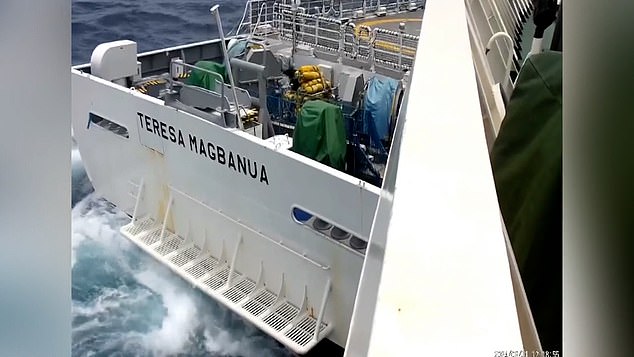
Philippine officials in Manila said it was their coast guard ship, the BRP Teresa Magbanua, that was rammed three times by the Chinese coast guard
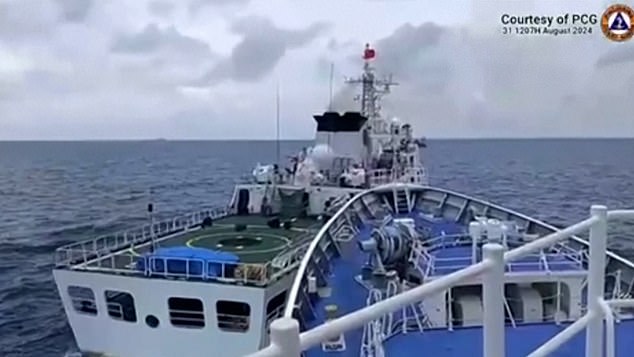
The Philippine ship, the Magbanua, has been anchored in Sabina since mid-April after Manila suspected that China would build a structure to take over the uninhabited atoll
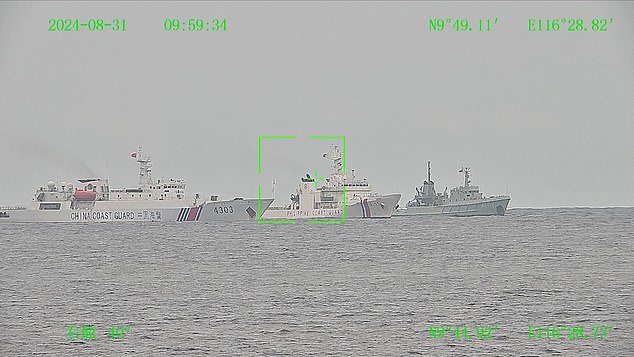
The incident is the second confrontation in days near Sabina Shoal, about 85 miles west of the Philippine province of Palawan, in the Philippines’ internationally recognized exclusive economic zone.
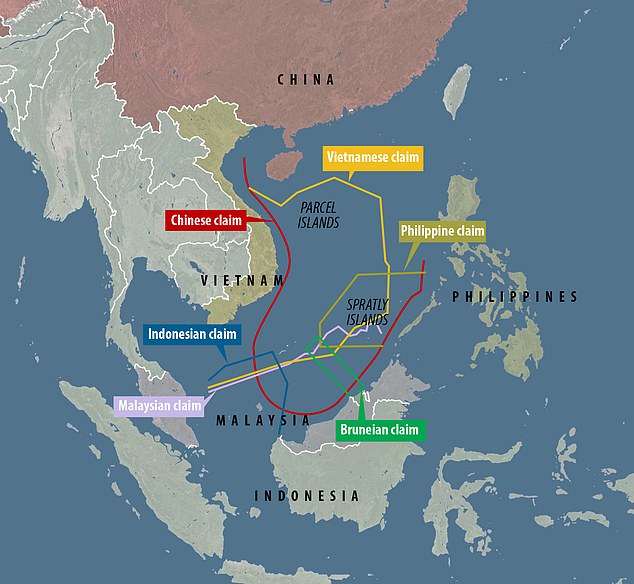
China claims nearly all of the oil- and resource-rich waters of the South China Sea and has ignored counterclaims from the Philippines, Vietnam, Taiwan, Brunei and Malaysia.
China has harbored the same suspicions and recently filed a diplomatic protest against the Philippines over the ship’s prolonged presence at the shoal.
Beijing is rapidly expanding its military and has become increasingly assertive in pursuing its claims over virtually the entire South China Sea, which is vital to international trade.
The tensions have led to more frequent confrontations, especially with the Philippines, and could also lead to confrontations with the United States, which is bound by treaty to defend the Philippines.
The long-running territorial disputes also involve other claimants, including Vietnam, Taiwan, Malaysia and Brunei.
China has rejected a ruling by a UN-backed arbitration panel that invalidated nearly all of its historic claims in the South China Sea.
Philippine Coast Guard Commodore Jay Tarriela said in Manila that the Magbanua had re-anchored and would not withdraw from Sabina Shoal, “despite the intimidation, harassment and escalating measures of the Chinese Coast Guard.”
Video released by the Philippine Coast Guard showed the Magbanua being rammed by a Chinese Coast Guard vessel.
The US condemned “the many dangerous violations of international law by the PRC (People’s Republic of China), including the deliberate ramming attack on the BRP Teresa Magbanua while the vessel was conducting lawful operations in the Philippines’ Exclusive Economic Zone.”
“We stand side by side with the Philippines in upholding international law,” U.S. Ambassador to Manila MaryKay Carlson said on X.
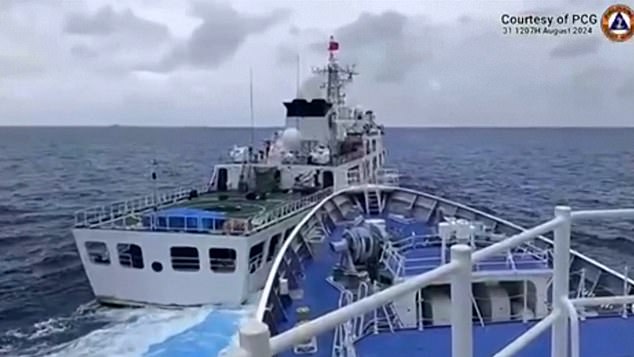
Beijing is rapidly expanding its military and has become increasingly assertive in pursuing its claim to virtually the entire South China Sea, which is vital to international trade.
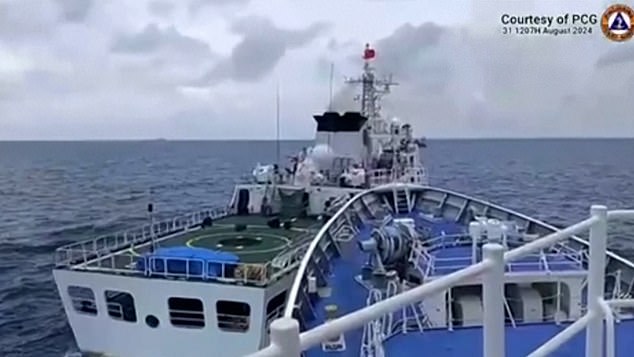
The tensions have led to more frequent confrontations, especially with the Philippines, and could also be confronted with the United States.
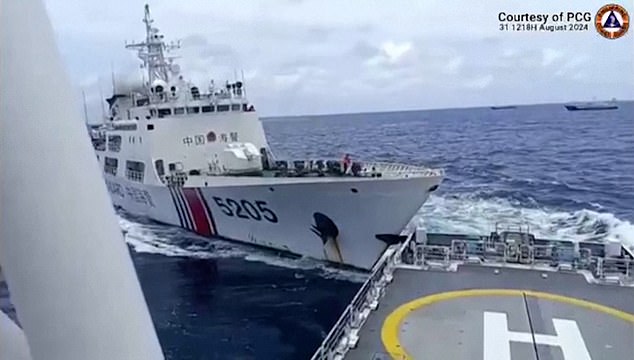
Long-standing territorial disputes also involve other claimants, including Vietnam, Taiwan, Malaysia and Brunei
The US has repeatedly warned that it must defend the Philippines if Philippine troops are targeted in an armed attack in the South China Sea.
On Tuesday, Admiral Samuel Paparo, head of the US Indo-Pacific Command, said the US military was open to discussions about escorting Philippine ships in the disputed waters.
The Chinese coast guard, navy and associated vessels regularly clash with Philippine vessels while attempting to resupply Filipino sailors stationed in parts of the South China Sea claimed by both countries.
As confrontations become increasingly hostile and Filipino sailors are injured and their ships damaged, the Philippine government is facing questions about invoking the treaty with Washington.
Sabina Shoal is near Second Thomas Shoal, another flashpoint where China has obstructed supplies to the Philippine military.
Both countries reached an agreement last month to avoid further confrontations at the sandbank.
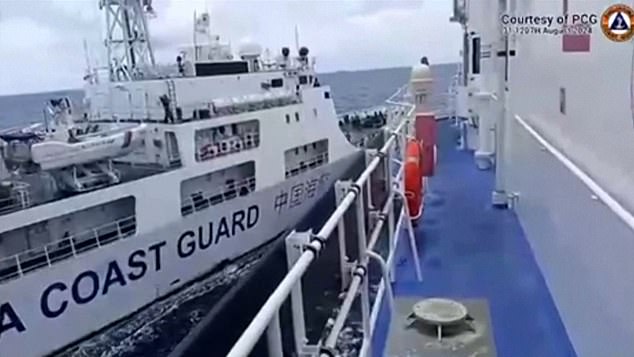
Video released by the Philippine Coast Guard appears to show the Magbanua being rammed by a Chinese Coast Guard vessel
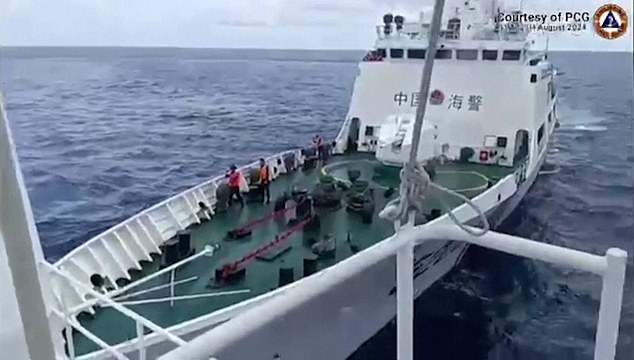
The US condemned “the multiple dangerous violations of international law by the PRC (People’s Republic of China)
Also on Saturday, Japan filed a formal protest through the Chinese embassy over what it called an incursion by a Chinese research vessel into its territorial waters.
The latest incident has raised concerns among Japanese defense officials, who were already concerned about increasing military cooperation between the Chinese and Russian air forces.
Tokyo also protested on Monday after a Chinese military plane briefly entered Japan’s southwestern airspace.
Lin Jian, spokesman for China’s Foreign Ministry, said Tuesday that his country has “no intention” to violate the airspace of any country.
